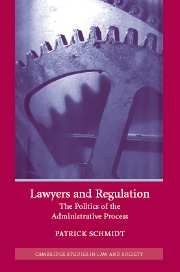Book contents
- Frontmatter
- Contents
- List of figures and tables
- Table of cases
- Acknowledgments
- List of abbreviations
- 1 Introduction
- 2 The contours of a regulatory bar
- 3 Administrative rulemaking
- 4 Rulemaking litigation
- 5 Enforcement
- 6 Regulatory counseling
- 7 Conclusion
- Appendix 1 Research methods
- Appendix 2 Survey instrument
- Notes
- Bibliography
- Index
4 - Rulemaking litigation
Published online by Cambridge University Press: 11 July 2009
- Frontmatter
- Contents
- List of figures and tables
- Table of cases
- Acknowledgments
- List of abbreviations
- 1 Introduction
- 2 The contours of a regulatory bar
- 3 Administrative rulemaking
- 4 Rulemaking litigation
- 5 Enforcement
- 6 Regulatory counseling
- 7 Conclusion
- Appendix 1 Research methods
- Appendix 2 Survey instrument
- Notes
- Bibliography
- Index
Summary
The gaps left by broad delegations from Congress leave enormous scope for discretion. In the balance of quasi-legislative and quasi-judicial elements in OSHA's “hybrid” rulemaking lies the project of creating rules with legislative effect while serving essential procedural values. Broad public participation, hearings, and the statutory roots of rulemaking suggest that agency decisionmaking mimics legislative practice, but judicial oversight of administrative agencies opens up additional avenues for private parties to challenge government action, forcing more formal rulemaking procedures and legal constraints on agency decisionmaking.
Framing the practices explored in chapter 3, serious and sustained opposition, often extending into legal conflict, has plagued the Occupational Safety and Health Administration, along with the other social regulatory agencies created in the late 1960s and early 1970s. Much scholarship in recent years has confronted the side-effects of the contemporary administrative process, as well as the apparent disconnection between the theory of administrative policymaking and its practice. Beyond those criticizing contemporary American administration from points within the prevailing paradigm, others have sought to push the administrative process in new directions. Most significant has been an array of approaches that seek less adversarial processes, particularly by encouraging discussion, collaboration, deliberation, and consensus-building. A regulator that spends as much time preparing for, and involved in, litigation as OSHA would seem to be a strong candidate for alternative designs.
As viewed by lawyers, formal administrative processes may not be the most significant stage of regulatory policymaking.
- Type
- Chapter
- Information
- Lawyers and RegulationThe Politics of the Administrative Process, pp. 96 - 136Publisher: Cambridge University PressPrint publication year: 2005



